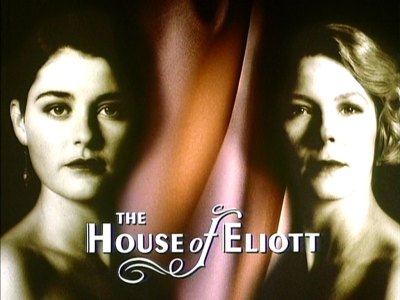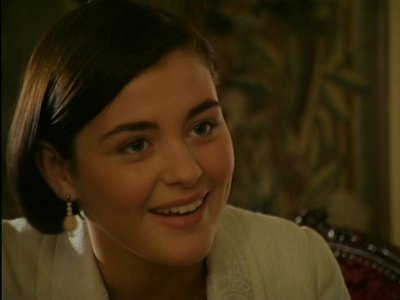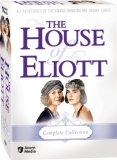| Reviews & Columns |
|
Reviews DVD TV on DVD Blu-ray 4K UHD International DVDs In Theaters Reviews by Studio Video Games Features Collector Series DVDs Easter Egg Database Interviews DVD Talk Radio Feature Articles Columns Anime Talk DVD Savant Horror DVDs The M.O.D. Squad Art House HD Talk Silent DVD
|
DVD Talk Forum |
|
|
| Resources |
|
DVD Price Search Customer Service #'s RCE Info Links |
|
Columns
|
|
|
House of Eliott - Complete Collection, The
Mammoth, but engrossing. Acorn Media has released 1991's The House of Eliott: Complete Collection on DVD, encompassing the entire three-season BBC series, on a whopping 12 discs for a total running time of over 29 hours! That is one big buffet for lovers of British TV. I saw promos for The House of Eliott when it ran on BBC America, but quite frankly, the idea of getting involved week after week in a story about the fashion industry in 1920s England - even though I'm a huge fan of British TV - seemed too big of an investment of my time. But, as fanatical buyers of TV-on-DVD sets will tell you, the only way to watch a TV series now is to wait until it hits disc, and then wallow in it for hours at a time - commercial free, of course.

Watching The House of Eliott: Complete Collection this way (I split it up into six days of five hours each) aids enormously in appreciating the flow of the series; it also helps keep the numerous characters straight, as well. Created by actress Jean Marsh and Eileen Atkins, who also brought America the ground-breaking series Upstairs, Downstairs (certainly PBS's Masterpiece Theatre's most prestigious hit), The House of Eliott: Complete Collection touches upon some of the same concerns that were looked at in their previous collaboration; most notably the friction between the moneyed, aristocratic classes and the various descending social strata. However, The House of Eliott: Complete Collection is specifically more concerned with the notion of women's independence in that great decade of change, the 1920s, while making sure to supply plenty of "soapy" moments to get you coming back for more.
The House of Eliott: Complete Collection, working within a standard "big novel" screenplay approach that juggles several characters over several years and through myriad emotional upheavals, manages to give a thorough (and rather harrowing) picture of just how limited women's roles were in England in the 1920s, while maintaining a sharply realized milieu in the near-perfect production design. Telling the story of sisters Beatrice (Stella Gonet) and Evangeline Eliott's (Louise Lombard) fall and rise, the series opens with the death of the girls' father, a highly respected doctor. While younger Evie openly grieves for her father, wiser, bitter older sister Bea can barely suppress her joy. Bea, used as a virtual slave to keep house and raise her younger sister (their mother died some time before, and their father was too miserly to hire help), was given no opportunities in life to escape the drudgeries of living with her penny-pinching father: no advanced schooling, no training, and certainly no work experience. And prior to his death, it appeared that Evie would suffer the same stifling life.
Sensing opportunity knocking, Bea and Evie outfit themselves in fine clothes, in anticipation of the settlement of their father's will, encouraged in the notion that they would make out handsomely by their cousin Arthur Eliott (Peter Birch), the executor of the will. Unfortunately, the women soon find out that their father left them precious little: only the house and a mountain of debt. Evidently, the spendthrift was able to come up with money for other uses, as the sisters soon find out. Their father, they soon discover, lavished money on another woman and his illegitimate son with her, while Evie and Bea went without. Eventually forced to sell the house (where they're cheated out of the full value by scheming Arthur and his controlling mother Lady Lydia Eliott (Barbara Jefford), the sisters soon realize that they must work for a living now.

After several attempts at finding work, Bea finally becomes engaged working as a secretary for society photographer Jack Maddox (Aden Gillett), a good-natured bounder who catches the eye of Evie. Evie, landing a menial position with a fashion house (courtesy of Lady Lydia), works in her spare time along with Bea, in fashioning home-made clothes for themselves, which capture the admiration of everyone who sees them. Soon, the sisters realize that to become truly independent, they must strike out on their own, and create their own fashion house: "The House of Eliott."
It wouldn't be in the scope of this review to go over every plot point that occurs in The House of Eliott: Complete Collection; after all, we're talking about almost thirty hours worth of storylines. And it's a fairly eventful saga, too, chock-full of liaisons, emotional rollercoaster rides, financial backstabbings, romantic intrigues, and all the other clichés of the soap opera genre that fans can't get enough of - especially when they're covered with a patina of English "class," and a tony accent. However, The House of Eliott: Complete Collection does quite a bit more than just deliver high-quality suds; it's quite persuasive in detailing the suffocating plight that these two women suffered, while celebrating their hard-won emancipation.
At every turn in the story, the screenplay is entirely sympathetic to the efforts of the sisters to break out of the bonds of an English class-conscious society that put little or no worth to them other than to be married and to be genteel (the lower class of women were treated with even less optimism; they were to be servants and/or invisible). I found this aspect of The House of Eliott: Complete Collection the most compelling; quite often with big, long, glossy soaps, you never feel a rooting interest in the characters. They exist to fulfill stereotypes, and their adventures follow formula. Here, while undeniably "soapy" in construction, The House of Eliott: Complete Collection is firmly rooted not only in a historical and societal context (the production design is nothing short of absolutely convincing), but in a firm emotional one, as well. Lombard and particularly Gonet are so convincing in their roles, and with the deck stacked heavily against them, you really start to pull for the Eliott sisters to succeed.
And with the long, long soap format of The House of Eliott: Complete Collection, there's plenty of time to get to know the main characters. Scenes don't need to be rushed nor little details overlooked, to give a more complete overview. There are times, however, where some continuity gaps do occur (for instance, there's a scene where Evie walks in on Jack with another woman, but you never see the result of this revelation), but amid all the churning plot points, they're not major mistakes. I can't say I was wild about the jazz score, either. On the thin side, it plays often - and often at the wrong moments that should be quiet. But these are minor quibbles at most; for a sustained effort at soap opera and social commentary, The House of Eliott: Complete Collection thoroughly succeeds.

The DVD:
The Video:
The full frame video image for The House of Eliott: Complete Collection looks good, considering the series was shot entirely on video -- both interiors and exteriors. Colors are muted, but that apparently is the work of the original production design. Minor compression issues do pop up, but they're not obtrusive.
The Audio:
The Dolby Digital English 2.0 stereo mix is strong, although the original audio mix can go in and out in some dialogue scenes. There are no subtitles or close-captioning options.
The Extras:
There's a 12 minute interview (from 2005) with Louise Lombard included, along with text filmographies for a few of the main actors, production notes on the series, a text background on 1920s fashion, and a photo gallery.
Final Thoughts:
A superior soaper, The House of Eliott: Complete Collection also contains some pithy social commentary on the limited roles of women in rigid, class-conscious England during the 1920s. A strong sweep to the narrative, combined with a fine British cast, along with superior production design, make The House of Eliott: Complete Collection a must for fans of serial British TV shows. I highly recommend The House of Eliott: Complete Collection.
Paul Mavis is an internationally published film and television historian, a member of the Online Film Critics Society, and the author of The Espionage Filmography.


|
| Popular Reviews |
| Sponsored Links |
|
|
| Sponsored Links |
|
|
| Release List | Reviews | Shop | Newsletter | Forum | DVD Giveaways | Blu-Ray | Advertise |
|
Copyright 2024 DVDTalk.com All Rights Reserved. Legal Info, Privacy Policy, Terms of Use,
Manage Preferences,
Your Privacy Choices | |||||||













